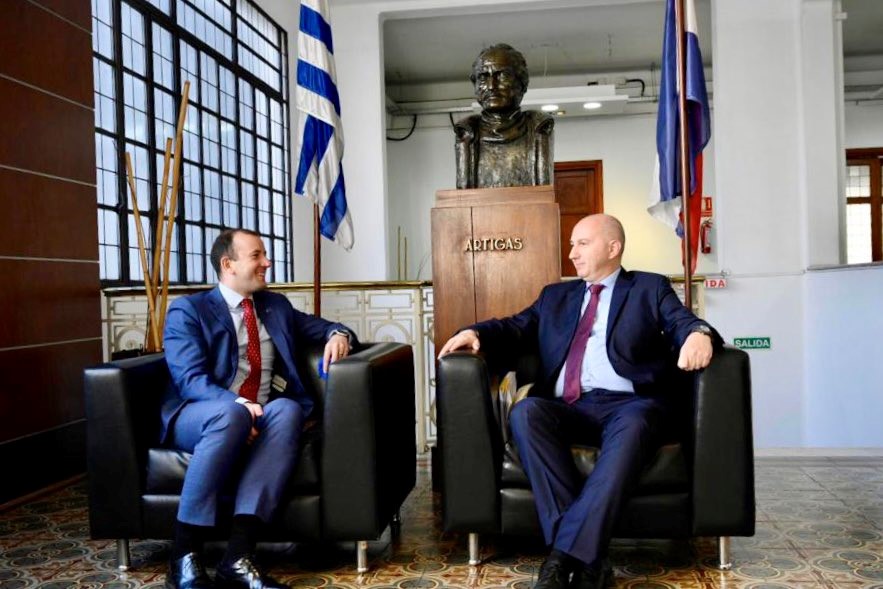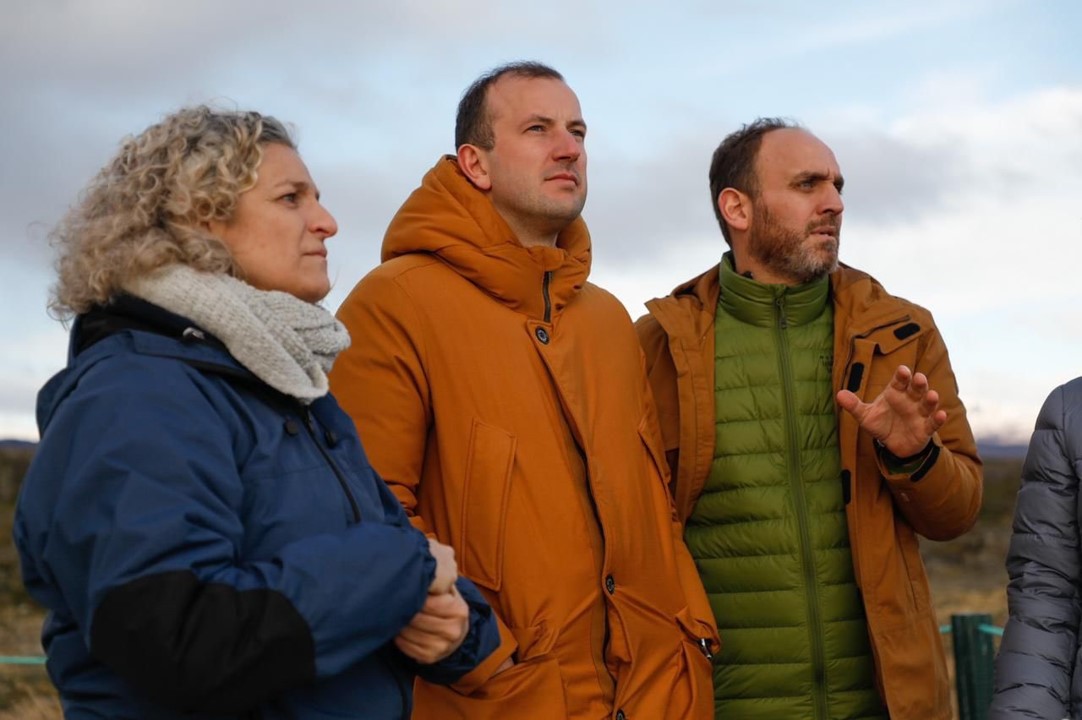Commissioner Sinkevičius’ mission to Latin America | 25 April – 4 May 2022

date: 01/07/2022
The visit to Colombia (25-27 April) served to kick off the bilateral cooperation agreed under the Joint Declaration on Environment, Climate Change and Sustainable Development signed in Brussels on 14 February 2022. The agenda of the visit included high-level meetings (with the President, Vice-President, Minister of Environment, Minister of Trade, and with representatives of the Chamber of Commerce and environmental institutes), field visits (to San José del Guaviare, Páramo, and Leticia), and meetings with environmental defenders, small businesses, and an indigenous community.
Meetings with the President and Vice-President intensified the already fluid high-level political dialogue, while presence in the territories contributed to EU visibility and appreciation. The visit to the Bogotá Chamber of Commerce enhanced Colombia’s understanding of the European Green Deal and the implications for the private sector. Explanations by the Commissioner about the proposed Deforestation Regulation and Farm to Fork Strategy contributed to dispel concerns about these new EU policies.
The visit, only two months after the signature of the Joint Declaration in Brussels, showed the EU’s readiness to advance quickly on the agreed steps, to strengthen positive cooperation in the area of sustainable development and to facilitate exchanges on the implementation of global commitments. The various meetings revealed alignment on many topics on the current international agenda, which is very important in view of the upcoming global environmental summits, CBD COP15 in particular.
Following the Joint Declaration kick-off, a high-level group meeting and technical dialogues should take place virtually on selected topics, such as Climate Change, Biodiversity/COP15, Circular Economy, and Oceans.
As regards the Deforestation Regulation, further information, guidance and training will be provided to Colombian institutions, including the private sector.
Likewise, the EU Delegation will engage in capacity building activities for the new Parliament and Government of Colombia, related to the environment and climate change.
In Brazil (27-30 April), Commissioner Sinkevičius reached the visit’s threefold objective. First, he had a complete vision of the voices of Brazil through a wide institutional and geographical coverage. Second, the mission achieved a significant impact on the bilateral relationship on environmental matters, in particular, in view of the CBD COP15, and the implementation of the EU deforestation-free value chains proposal. Third, public diplomacy and the visibility of the EU were enhanced, through wide media coverage about the visit, interviews with international and national media, and presence in social networks.
This mission to Brazil confirmed that payments for environmental services are a recurrent and sensitive issue for most of the Commissioner’s interlocutors, which is likely to resurface in COP15 in Montreal. Minister Leite highlighted the merits of the “Foresta+” domestic programme, as a possible blueprint that could be replicated in other countries. In anticipation of future negotiations, a detailed evaluation of the “Foresta +” will be conducted by the EU.
The visit to the anti-deforestation centre in Manaus (IPAAM) provided Commissioner Sinkevičius with an insight into Brazil’s geospatial and cadastral data to respond to the requirements of the future legislation.
It is also noteworthy that, during his visit to Brazil, Commissioner Sinkevičius managed to raise the political profile of sustainable mining and sustainable critical raw material value chains for the Green Deal, in particular niobium, of which Brazil holds 85 % of world reserves. In this sense, a Partnership for Sustainable Raw Materials Value Chains was envisaged.
The focus of the visit to Argentina (1-3 May) was on marine protection issues (especially around Antarctica), biodiversity, and deforestation, as the country also suffers from the phenomenon — albeit at a lesser degree than Brazil.
The Commissioner met with the ministers of Foreign Affairs; Environment; and Agriculture, Livestock and Fisheries; as well as with Deputies, representatives of civil society, the governor of the province of Corrientes (recently devastated by fires) and provincial and local authorities of Tierra del Fuego and Ushuaia, respectively, where the field visit took place.

In his visit to Ushuaia, the Commissioner gathered first-hand inputs from local authorities and experts from local universities and research centres on the current challenges related to ocean preservation (including the protection and preservation of land and marine biodiversity), such as overfishing by foreign vessels, waste and excessive tourism. During his visit to this province and in meetings held with regional and national authorities, the Commissioner discussed Marine Protected Areas (MPAs) around Antarctica, establishing links with national, provincial and municipal authorities for long-term engagement with the EU.
As regards the Deforestation Regulation, the Commissioner explained the main drivers and elements of the proposal, indicating the commitment to keep an active dialogue with trading partners to avoid a negative impact on producers and operators, as well as to improve governance and monitoring systems via existing technical assistance programmes and policy dialogues. Further information, guidance and training will be provided to Argentina, including the private sector, when the regulation is adopted or when scope and provisions are clear.
With regards to agriculture, the Minister and the Commissioner discussed the Russian aggression on Ukraine and its impacts on the Latin American region, the challenge of responding to the increased demand for production to address food security, and sustainable agricultural models. As a follow-up to this meeting, the EU will explore ways of deepening cooperation with Argentina on sustainable agricultural production.
The impact that climate change is having came to light during the visit. Stakeholders mentioned that the central and northern parts of the country are increasingly affected by droughts and fires, including the shrinking of the Paraná River, Argentina's main water ‘highway’ through which most of its agricultural exports pass, which has triggered a sharp increase in logistics costs. In this regard, the Commissioner showed the EU's willingness to constructively support Argentina in improving the agenda to face climate change challenges, highly linked to biodiversity and environmental issues.
Commissioner Sinkevičius took the opportunity to relaunch the EU-Argentine Partnership to promote the green agenda and to fight deforestation in international fora.
Finally, in Uruguay, the Commissioner met with the Ministers of Environment; Livestock, Agriculture and Fisheries; Economy and Finance; and Foreign Affairs. The Ministers showed interest in having details of the Deforestation Regulation, despite Uruguay being a country with high standards of sustainability in agricultural production and without deforestation problems. Thus, as for other countries, further information, guidance and training shall be provided to Uruguay’s public and private sectors.
As Uruguay is at the forefront in the implementation of responsible environmental policies and in the use of green energies, opportunities for importing green hydrogen to the EU will be explored.
Uruguay, for its part, would like to benefit from European experience in the area of circular economy, recycling and waste treatment, notably with regard to electronics and plastics, which have a very low recycling rate in this country.
Further meetings were scheduled in Brussels to follow up on the matters discussed.
